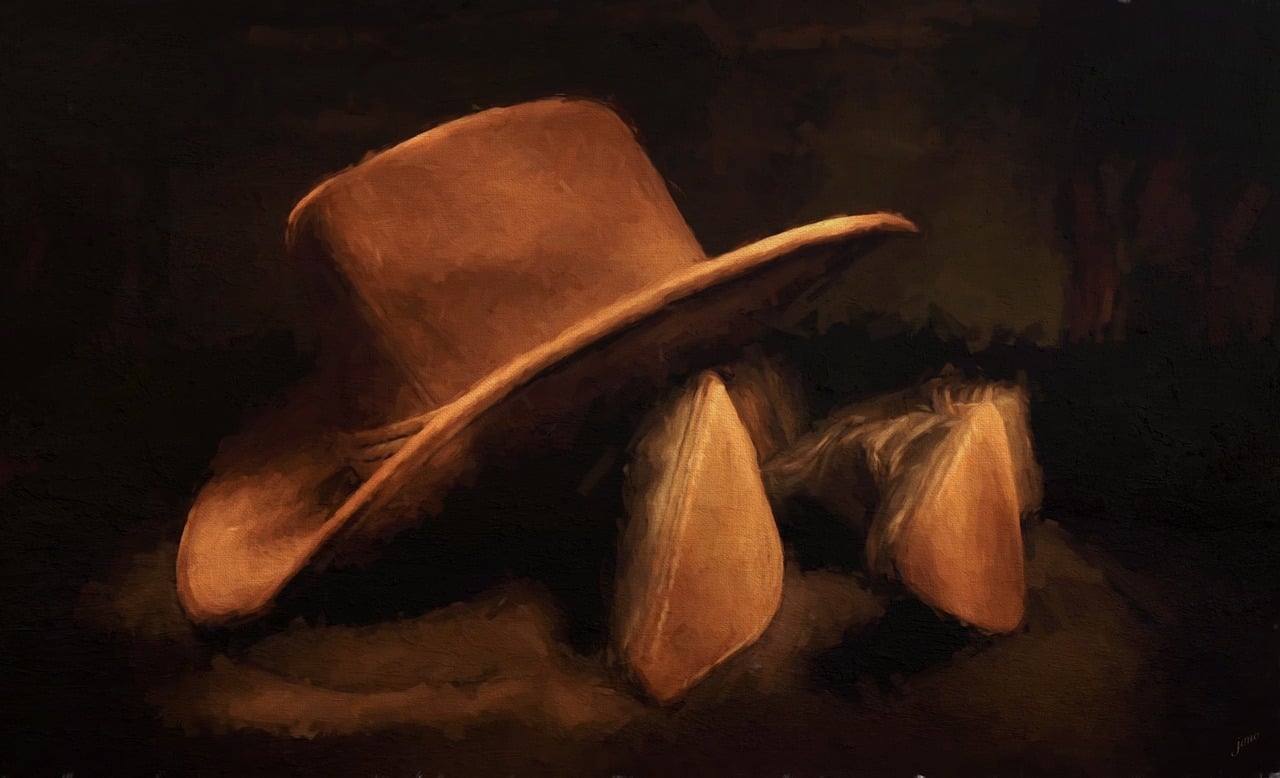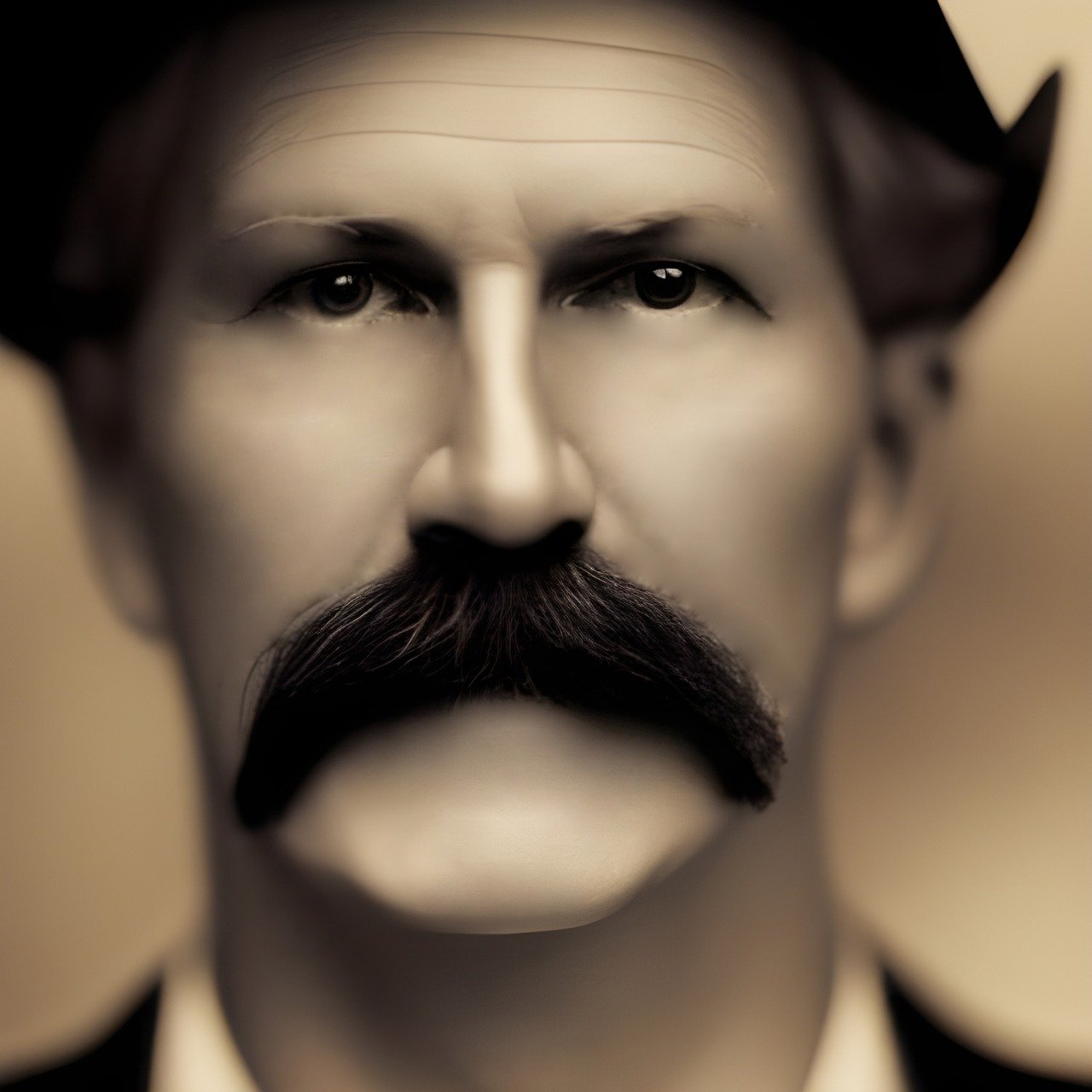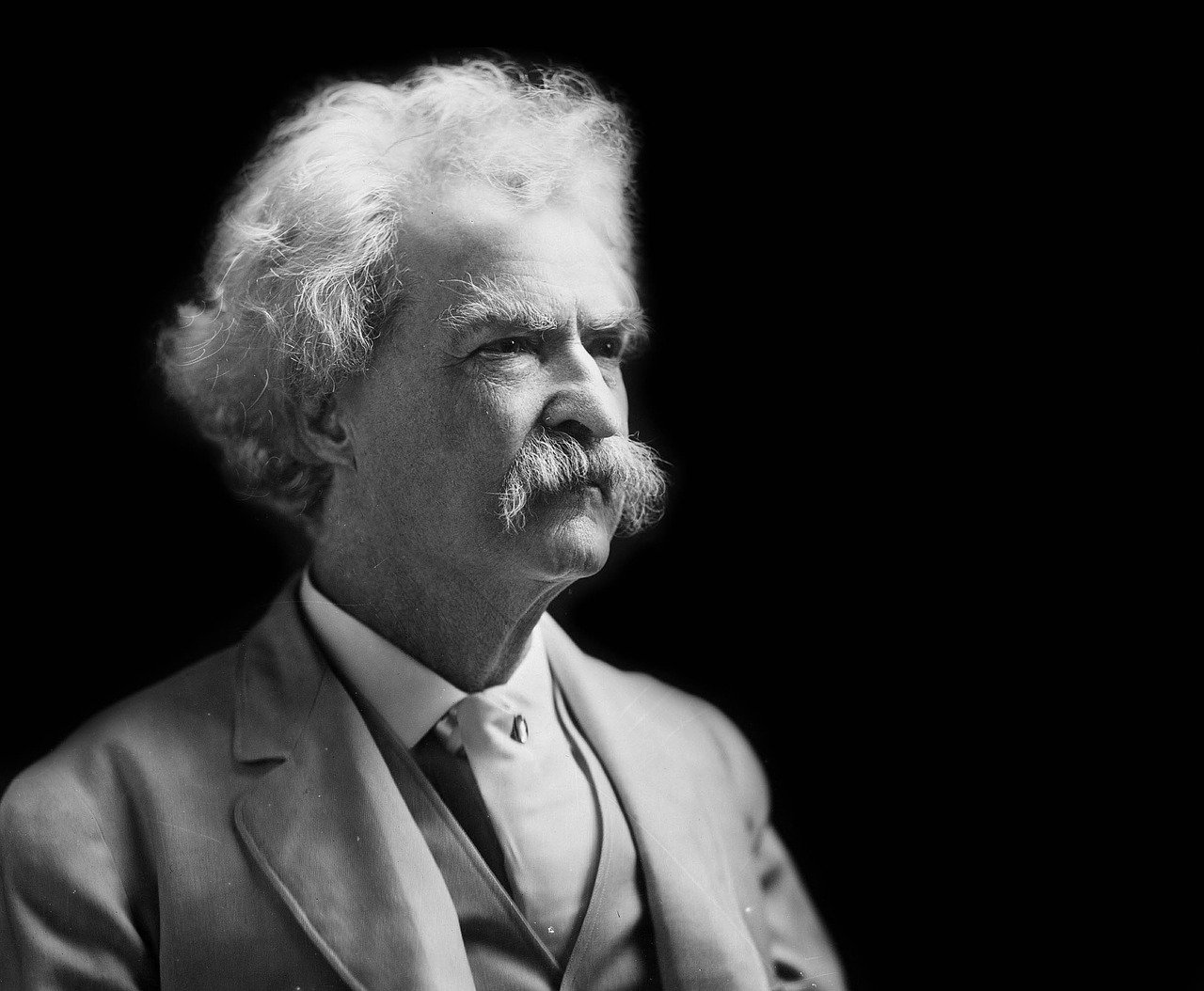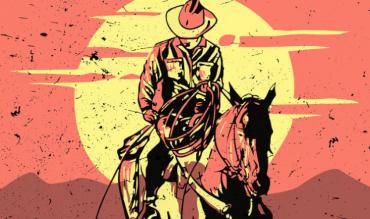Here are some of the real-life characters who played at the poker tables in the Old West:
- Card-playing cowboys
- Big-bluffing bankers
- Lucky lawmen
- Miners flush with cash
- Outlaws ready to gamble
- Lumberjacks - looking for some fun
- Cheaters - seeking to separate unwitting players from their hard-earned dollars
Almost every saloon, pool hall, and gambling house in the 19th Century featured a poker table. And there was always a fascinating collection of players gathered for some action.
These games mainly featured men at that time, although a few women also played. Many of these individuals were regularly armed in case a cheater was discovered, or a fight broke out.
Part 1 of this series focused on several famous poker players of the Old West.
Here’s a look at a few more real-life characters known to bet and bluff in the Old West.
1 – Bat Masterson
This Old West figure lived quite an exciting life. He worked as an Army scout, lawman, buffalo hunter, and journalist at various times. He had many adventures in the late 19th and early 20th centuries.
Born Bartholemew William Barclay Masterson in 1853 in Quebec, Masterson became better known by the nickname “Bat.”
Masterson was involved in several shootouts as a sheriff in Dodge City, Kansas. The gunslinger was known as a “sporting man” throughout his life. This term describes someone heavily involved in gambling and sports.

That life included plenty of faro (another popular gambling card game at the time) and poker. Masterson was even involved in a gunfight in 1876 while playing draw poker at a saloon in Sweetwater, Texas. A man named Melvin King was angry about losing in the game and left briefly before returning with his pistol.
King shot Masterson in the pelvis along with a dance hall girl he’d been chatting with. She died, but Masterson returned fire and killed King. The gambler and gunslinger recovered but required a cane to walk for the rest of his life. The incident added even more to his legacy.
“The Sweetwater gunfight essentially ends there, though many repetitions thereafter helped vault Masterson to the status of one of the West’s most legendary gunfighters,” author Martin Harris notes in the book Poker & Pop Culture.
“His reputation as a poker player and gambler continued to grow as well, thanks to his travels throughout several states and many instances of winning large sums at the tables.”
Masterson was a dandy who favoured a derby-style hat and well-kept suit. He pushed back against the notion that he was a killer, involved in numerous shootouts. He later moved to New York in 1902 and worked as a columnist for The Morning Telegraph newspaper. There, Masterson covered boxing and other sports until his death in 1921.
His exploits would be kept alive in the coming years. They were often fictionalised in novels, movies, television shows, comic books, video games, and more.
2 – Jefferson Randolph Smith II (AKA Soapy Smith)
Fans of HBO's Deadwood series may recognise the name Soapy Smith. For much of his time in the American West, Smith worked as a con artist, gangster, and gambler.
His poker skills involved more than just having good reads and understanding the game. He spent much of his life as a card cheat and gambling proprietor.

Smith was born to a wealthy and influential family in Georgia in 1860. They left for Round Rock, Texas, in 1876 after facing financial ruin after the Civil War. Smith began picking up various cons during this time after the death of his mother.
He then headed out on his own and moved north to Fort Worth, where he put more of his common scams into practice.
One of those common scams would eventually give him the nickname “Soapy.” He’d set up with several bars of soap for sale on a busy street corner. As an “incentive” for customers to make purchases, he’d slip cash under the wrappers of several bars. He would use his sleight-of-hand skills to remove the bills from the bars.
Sales would spike up, but he was the only one making money!
Smith moved to Denver in 1879 and set up a gambling house there in 1888. He and his brother Bascomb ran rigged poker games before moving to Creede, Colorado. They eventually headed to Klondike during the gold rush in Canada’s Yukon Territory.
The scams and rigged games continued, including in Skagway, Alaska. But town leaders eventually formed a vigilante group, fed up with Smith’s scams and poker cheating.
This move would finally stop all his scams and poker cheating – in typical Wild West style.
“On this day in 1898, Smith tried to crash a vigilante meeting on the Skagway wharf, apparently hoping to use his con-man skills to persuade them that he posed no threat to the community,” History.com notes.
“Smith, however, had failed to realize just how angry the vigilantes were. When he tried to break through the crowd, a Skagway city engineer named Frank Reid confronted him. The men exchanged harsh words and then bullets. Reid shot Smith dead on the spot, but not before Smith had badly wounded him. The engineer died 12 days later.”
3 – Carlotta J. Thompkins (aka Lottie Deno)
One of the few women poker players of the Old West, Lottie Deno was born in 1844 into a wealthy family in Kentucky. Her father was a plantation owner, and she travelled extensively with him growing up.
These trips included casinos, where she learned how to play cards. After her father's death, Deno embarked on a life of gambling and poker to help support her family.

That eventually led to poker games along the Mississippi River and throughout Texas and New Mexico. She was nicknamed Lottie Deno, with the last name a bastardised version of the Spanish word for money – dinero.
She travelled from town to town playing cards with her husband, Frank Thurmond.
Like many players of the time, the pair looked to separate frontiersmen from some of their hard-earned money. In Texas, that included buffalo hunters who could rack up some big bucks for collecting these animal hides.
Many players remember Deno for her considerable skills at the table. Her magnetic personality, brilliant clothing, and dresses were uncommon in many poker games.
“Lottie’s dexterity in handling the cards soon won her the respect of the biggest gamblers in San Antonio, and she was a welcome companion at many tables,” J. Marvin Hunter writes in The Story of Lottie Deno: Her Life and Times.
“Her grace and beauty soon opened the doors for her everywhere, and her refinement and good breeding brought her fame and untold success.”
By 1877, Deno and Thurmond were operating their own gambling house in Kingston, New Mexico. They then settled in Deming, New Mexico, before leaving poker and gambling behind. He became the vice president of a local bank, and Deno began teaching Sunday school for the town’s Episcopal church.
She passed away in 1834, with her headstone recognising her as Charlotte Thurmond.
She is believed to have inspired the character of Miss Kitty Russell in the television series Gunsmoke, which ran from 1955-75.
4 – “Canada” Bill Jones
Born in Yorkshire, England, Bill Jones (1837–1877) worked as a con man, gambler, and poker player throughout the U.S. and Canada. Like Soapy Smith, he brought a bit of the “outlaw” to Old West gambling.
He ran three-card Monte scams, working as a cardsharp (cheater) in poker games along the Mississippi River.

Beyond poker, Jones also enjoyed playing the popular card game faro but had a knack for putting any winnings back into the game. A detective once described him “as gentle as a woman and as cunning as a fox” and "could beat any man at his own game," - according to the book Forty Years a Gambler on the Mississippi by George Devol.
In 1874, Jones moved to Chicago and opened four gambling houses with a couple of associates. He won using some of his traditional means in the Windy City and later Cleveland. But he also lost much of his own money to more square card games and got cheated himself on occasion.
“He loved gambling for its own sake just as the moralists love virtue for its own sake,” Devol wrote. “No man that I ever came in contact with ever struck me as being so fond of gambling.”
Like famed gunslinger and poker player Doc Holliday, tuberculosis took its toll on Jones. He became quite sick in 1877, eventually taking his life that year after spending some time at a charity hospital in Reading, Pennsylvania.
At about 40 years old, he died virtually penniless—a group of gamblers paid for the funeral. Several friends attempted to take bets on whether the entire ordeal was some hoax.
In the well-regarded 1998 film Rounders, Matt Damon’s poker-playing character Mike McDermott uses a saying, credited to Jones:
“It's immoral to let a sucker keep his money.”
5 – Mark Twain
Many may not think of the famed author as an Old West figure. But Twain lived from 1835 to 1910 – right in the middle of U.S. Westward expansion. The cigar-puffing writer not only enjoyed time at the pool table but also at the poker table.
Working as a riverboat pilot on the Mississippi River in the 1850s and ‘60s brought many opportunities to play and learn the game. However, cheating was a significant part of the poker scene at the time.
So, Twain offered some words of warning about potential cardsharps taking advantage of suckers riding the boats.
In the story “The Professor’s Yarn” from Life on the Mississippi, a man named Backus is aboard a ship heading west with $10,000 to purchase a ranch. The professor warns him of playing cards during the journey, noting the numerous hustlers on board and the “den of rascality” in which they frequently play.
Life on the Mississippi even featured intricate sketches of river scenes, including four poker-related works.

Dr Peter Messent, author of the new book, Mark Twain and Male Friendship and former head of American and Canadian Studies at the University of Nottingham in the U.K., believed poker was an essential game for Twain. The social and friendly nature would have resonated with the author, who was a bit of a “man’s man” throughout his life.
“Poker would, presumably, have been a part of Twain’s frontier world, and there is every indication that he knew the game well,” says Messent. “Certainly, its rituals would have suited his liking for male companionship and for the good talk to be had there.”
In his writings, Twain regularly mentioned poker and some jargon from the game. A detailed knowledge of the game’s intricacies as part of his works exemplifies Twain’s fondness for the game.
During a trip to the West, Twain wrote in 1862 about the plight of American Indians and observed a poker game that was underway. He wrote about the game:
“First they ‘dealt’ and ‘antied’, threw up their ‘hands,’ and ‘doubled the pot,’ and dealt again.”
His knowledge of the game included sprinkling in terms like “bluffing”, “straddling the blind”, “aces full”, and, as many players have experienced firsthand, getting “busted.”


